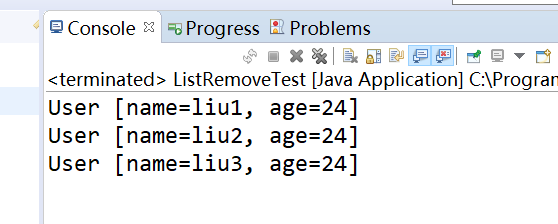java集合遍历删除指定元素异常分析总结
在使用集合的过程中,我们经常会有遍历集合元素,删除指定的元素的需求,而对于这种需求我们往往使用会犯些小错误,导致程序抛异常或者与预期结果不对,本人很早之前就遇到过这个坑,当时没注意总结,结果前段时间又遇到了这个问题,因此,总结下遍历集合的同时如何删除集合中指定的元素;
1.错误场景复原
public class ListRemoveTest {
public static void main(String[] args) {
List<User> users = new ArrayList<User>();
users.add(new User("liu1",24));
users.add(new User("liu2",24));
users.add(new User("liu3",24));
users.add(new User("liu4",24));
Iterator<User> iterator = users.iterator();
while(iterator.hasNext()) {
User user = iterator.next();
if(user.getName().equals("liu2")) {
users.remove(user);
}
System.out.println(user);
}
}
}
或者如下代码
public class ListRemoveTest {
public static void main(String[] args) {
List<User> users = new ArrayList<User>();
users.add(new User("liu1",24));
users.add(new User("liu2",24));
users.add(new User("liu3",24));
users.add(new User("liu4",24));
for (User user : users) {
if(user.getName().equals("liu2")) {
users.remove(user);
}
System.out.println(user);
}
}
}
以上两种用法都会跑出如下异常:

2.原因分析
上面两种错误,我想很多人都遇到过,这是我们很容易犯的错误,但是为啥会出现上述异常呢,我们又该如何正确遍历集合的同时,删除指定的元素呢!
2.1 原因解析
首先,对于foreach循环遍历,本质上还是迭代器的模式,上面的for语句等价于如下代码:
for (Iterator<User> iterator = users.iterator(); iterator.hasNext();) {
User user = iterator.next();
if(user.getName().equals("liu2")) {
users.remove(user);
}
System.out.println(user);
}
因此,上述错误的本质,就要看迭代器iterator的源码啦
在ArrayList中,它的修改操作(add/remove)都会对modCount这个字段+1,modCount可以看作一个版本号,每次集合中的元素被修改后,都会+1(即使溢出)。
public boolean remove(Object o) {
if (o == null) {
for (int index = 0; index < size; index++)
if (elementData[index] == null) {
fastRemove(index);
return true;
}
} else {
for (int index = 0; index < size; index++)
if (o.equals(elementData[index])) {
fastRemove(index);
return true;
}
}
return false;
}
private void fastRemove(int index) {
modCount++;
int numMoved = size - index - 1;
if (numMoved > 0)
System.arraycopy(elementData, index+1, elementData, index,
numMoved);
elementData[--size] = null; // clear to let GC do its work
}
接下来再看看AbsrtactList中iteraor方法
public Iterator<E> iterator() {
return new Itr();
}
它返回一个内部类,这个类实现了iterator接口,代码如下:
private class Itr implements Iterator<E> {
int cursor = 0;
int lastRet = -1;
int expectedModCount = modCount;
public boolean hasNext() {
return cursor != size();
}
public E next() {
checkForComodification();
try {
E next = get(cursor);
lastRet = cursor++;
return next;
} catch (IndexOutOfBoundsException e) {
checkForComodification();
throw new NoSuchElementException();
}
}
public void remove() {
if (lastRet == -1)
throw new IllegalStateException();
checkForComodification();
try {
AbstractList.this.remove(lastRet);
if (lastRet < cursor)
cursor--;
lastRet = -1;
// 修改expectedModCount 的值
expectedModCount = modCount;
} catch (IndexOutOfBoundsException e) {
throw new ConcurrentModificationException();
}
}
final void checkForComodification() {
if (modCount != expectedModCount)
throw new ConcurrentModificationException();
}
}
在内部类Itr中,有一个字段expectedModCount ,初始化时等于modCount,即当我们调用list.iterator()返回迭代器时,该字段被初始化为等于modCount。在类Itr中next/remove方法都有调用checkForComodification()方法,在该方法中检测modCount == expectedModCount,如果不相等则抛出ConcurrentModificationException。
前面说过,在集合的修改操作(add/remove)中,都对modCount进行了+1。
在迭代过程中,执行list.remove(val),使得modCount+1,当下一次循环时,执行
it.next(),checkForComodification方法发现modCount != expectedModCount,则抛出异常。
2.2 预期结果不对,但是不抛异常
注意:还有一种更坑的场景,当删除集合的倒数第二个元素时,程序不会抛出任何异常,只是结果与预期的不相符,如果在应用过程中不认真观察,很难发现该错误!
错误实例如下:
public static void main(String[] args) {
List<User> users = new ArrayList<User>();
users.add(new User("liu1",24));
users.add(new User("liu2",24));
users.add(new User("liu3",24));
users.add(new User("liu4",24));
Iterator<User> iterator = users.iterator();
while(iterator.hasNext()) {
User user = iterator.next();
if(user.getName().equals("liu3")) {
users.remove(user);
}
System.out.println(user);
}
}
运行结果如下:

遍历过程删除了倒数第二个元素,那么最后一个元素就永远遍历不到了,这个主要原因就是Iterator源码中hasNext方法中,判断当前元素下标和集合大小是否相等
public boolean hasNext() {
return cursor != size;
}
当删除倒数第二个元素后,当前元素下标和集合的大小相等了,跳出了循环,就会遍历最后一个集合元素了;
3.正确用法
要想在集合遍历的过程中删除指定元素,就务必使用迭代器自身的remove方法;
再来看看内部类Itr的remove()方法,在删除元素后,有这么一句expectedModCount
= modCount,同步修改expectedModCount
的值。所以,如果需要在使用迭代器迭代时,删除元素,可以使用迭代器提供的remove方法。
其他集合(Map/Set)使用迭代器迭代也是一样。
所以 Iterator 在工作的时候是不允许被迭代的对象被改变的。
但你可以使用 Iterator 本身的方法 remove() 来删除对象, Iterator.remove() 方法会在删除当前迭代对象的同时维护索引的一致
具体正确用法代码如下:
public class ListRemoveTest {
public static void main(String[] args) {
List<User> users = new ArrayList<User>();
users.add(new User("liu1",24));
users.add(new User("liu2",24));
users.add(new User("liu3",24));
users.add(new User("liu4",24));
Iterator<User> iterator = users.iterator();
while(iterator.hasNext()) {
User user = iterator.next();
if(user.getName().equals("liu2")) {
iterator.remove();
}
System.out.println(user);
}
System.out.println(users);
}
}
运行结果如下:

与预期结果一致;
java集合遍历删除指定元素异常分析总结的更多相关文章
- vector list map 遍历删除指定元素
#include <stdio.h> #include <stdint.h> #include <vector> #include <list> #in ...
- Java集合——遍历集合元素并修改
Java集合——遍历集合元素并修改 摘要:本文主要总结了遍历集合的方式,以及在遍历时修改集合要注意的问题. 遍历Collection 对List和Set的遍历,有四种方式,下面以ArrayList为例 ...
- java集合系列之ArrayList源码分析
java集合系列之ArrayList源码分析(基于jdk1.8) ArrayList简介 ArrayList时List接口的一个非常重要的实现子类,它的底层是通过动态数组实现的,因此它具备查询速度快, ...
- Java集合系列[4]----LinkedHashMap源码分析
这篇文章我们开始分析LinkedHashMap的源码,LinkedHashMap继承了HashMap,也就是说LinkedHashMap是在HashMap的基础上扩展而来的,因此在看LinkedHas ...
- java集合系列之LinkedList源码分析
java集合系列之LinkedList源码分析 LinkedList数据结构简介 LinkedList底层是通过双端双向链表实现的,其基本数据结构如下,每一个节点类为Node对象,每个Node节点包含 ...
- jquery数组删除指定元素的方法:grep()
jquery数组删除指定元素的方法:grep() 金刚 数组 jquery javascript 元素 遇到的问题 今天遇到一个问题,删除数组中的一个指定元素,并返回新的数组. 我定义的js数组是这样 ...
- java集合循环删除
java集合循环删除,java list集合操作,java循环.分享牛,分享牛原创.java集合删除方法. 2.6.1.第一种方式 list.add("1"); list.add( ...
- List 循环删除 指定元素的 方法
使用Iterator进行循环,在删除指定元素.如果使用for 或 foreach 在删除指定下标是,list.size 会相应的缩短且下标前移,导致相邻满足条件的元素未删除 Iterator<S ...
- ES6数组中删除指定元素
知识点: ES6从数组中删除指定元素 findIndex()方法返回数组中满足提供的测试函数的第一个元素的索引.否则返回-1. arr.splice(arr.findIndex(item => ...
随机推荐
- Tornado 自定义session,与一致性哈希 ,基于redis 构建分布式 session框架
Tornado 自定义session,与一致性哈希 ,基于redis 构建分布式 session import tornado.ioloop import tornado.web from myhas ...
- [Linux] ssh免密码登录
目标:本地机器ssh登录远程目标机器时不用输入密码 (默认状态下,ssh user@192.xxx.x.xxx需要输入密码) 原理:通过公钥和私钥实现系统认证 实现:把本地机器的公钥复制到目标机器 具 ...
- UTL_DBWS包的创建和用法
UTL_DBWS - Consuming Web Services in Oracle 10g In a previous article I presented a method for Consu ...
- iOS 解决上传100张图片内存奔溃问题
最近项目需求,从相册中提取100张图片,然后上传到服务器.前提是图片不能压缩.因为要将图片信息采集出来制作出3D模型.所以必须是高清图片. 先看下代码 [NetWorking uploadWithUr ...
- NSLog 打印出方法函数,行数,内容
#if DEBUG #define NSLog(FORMAT, ...) fprintf(stderr,"\nfunction:%s line:%d content:%s\n", ...
- NHibernate 01 [简述]
本节内容: 系列简述 NHibernate是什么? NHibernate好处? 1.系列简述 最近在项目中使用到NHibernate,所以记录下自己学习的内容和步骤. 2.NHibernate是什么? ...
- day5 io模型
五种概览:http://www.cnblogs.com/xiehongfeng100/p/4763225.html http://sukai.me/linux-five-io-models/ 内有多 ...
- Java并发--并发容器之CopyOnWriteArrayList
原文链接:http://ifeve.com/java-copy-on-write/ Copy-On-Write简称COW,是一种用于程序设计中的优化策略.其基本思路是,从一开始大家都在共享同一个内容, ...
- python(十三):网络编程之socket与socketserver
socket是操作系统中I/O系统延伸部分,支持TCP和UDP等网络通信协议,它使计算机之间(或其本身)的进程通信称为可能.socket中的socket()函数.recv()函数和send()函数,相 ...
- ubuntu 新手帖
作为菜鸟,接触ubuntu的时间不长,遇到一些问题,在这总结一下,可能不全不完善,但是希望能有用: 1,ubuntu 12.04的gedit打开中文记事本全是乱码的处理 参考:http://bbs.c ...
